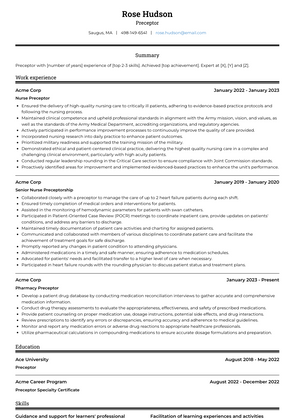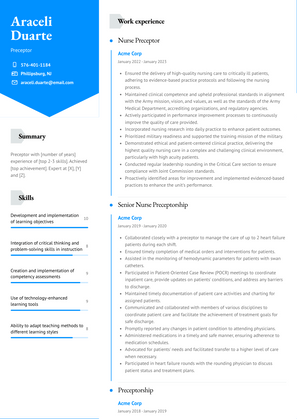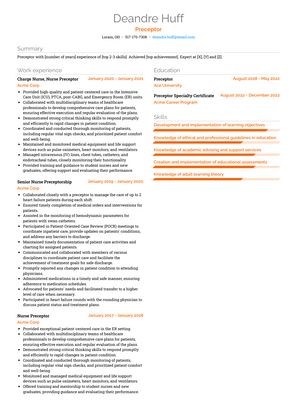Preceptor Resume Examples and Templates
This page provides you with Preceptor resume samples to use to create your own resume with our easy-to-use resume builder. Below you'll find our how-to section that will guide you through each section of a Preceptor resume.



What Do Hiring Managers Look for in a Preceptor Resume
- Proficient in serving as a preceptor to guide and mentor students, interns, or new professionals in a specific field or industry.
- Strong knowledge and expertise in the subject matter, techniques, and best practices.
- Skilled in providing hands-on training, supervision, and constructive feedback.
- Ability to assess the progress and performance of the individual and tailor guidance accordingly.
- Proficiency in fostering a supportive learning environment and promoting professional development.
How to Write a Preceptor Resume?
To write a professional Preceptor resume, follow these steps:
- Select the right Preceptor resume template.
- Write a professional summary at the top explaining your Preceptor’s experience and achievements.
- Follow the STAR method while writing your Preceptor resume’s work experience. Show what you were responsible for and what you achieved as a Preceptor.
- List your top Preceptor skills in a separate skills section.
How to Write Your Preceptor Resume Header?
Write the perfect Preceptor resume header by:
- Adding your full name at the top of the header.
- Add a photo to your resume if you are applying for jobs outside of the US. For applying to jobs within the US, avoid adding photo to your resume header.
- Add your current Preceptor position to the header to show relevance.
- Add your current city, your phone number and a professional email address.
- Finally, add a link to your portfolio to the Preceptor resume header. If there’s no portfolio link to add, consider adding a link to your LinkedIn profile instead.
Bad Preceptor Resume Example - Header Section
Katrina 682 Fifth St. South Plainfield, NJ 07080 Marital Status: Married, email: cooldude2022@gmail.com
Good Preceptor Resume Example - Header Section
Katrina Tanner, Plainfield, NJ, Phone number: +1-555-555-5555, Link: linkedin/in/johndoe
Make sure to add a professional looking email address while writing your resume header. Let’s assume your name is John Doe - here is a formula you can use to create email addresses:
- firstnamelastname@email.com - johndoe@email.com
- firstname.lastname@email.com - john.doe@email.com
- lastname.firstname@email.com - doe.john@email.com
- f.lastname@email.com - j.doe@email.com
- l.firstname@email.com - d.john@email.com
- firstnamelastname12@email.com - johndoe12@email.com
For a Preceptor email, we recommend you either go with a custom domain name (john@johndoe.com) or select a very reputed email provider (Gmail or Outlook).
How to Write a Professional Preceptor Resume Summary?
Use this template to write the best Preceptor resume summary: Preceptor with [number of years] experience of [top 2-3 skills]. Achieved [top achievement]. Expert at [X], [Y] and [Z].
How to Write a Preceptor Resume Experience Section?
Here’s how you can write a job winning Preceptor resume experience section:
- Write your Preceptor work experience in a reverse chronological order.
- Use bullets instead of paragraphs to explain your Preceptor work experience.
- While describing your work experience focus on highlighting what you did and the impact you made (you can use numbers to describe your success as a Preceptor).
- Use action verbs in your bullet points.
Pharmacy Preceptor Resume Example
Pharmacy Preceptor
- Develop a patient drug database by conducting medication reconciliation interviews to gather accurate and comprehensive medication information.
- Conduct drug therapy assessments to evaluate the appropriateness, effectiveness, and safety of prescribed medications.
- Provide patient counseling on proper medication use, dosage instructions, potential side effects, and drug interactions.
- Review prescriptions to identify any errors or discrepancies, ensuring accuracy and adherence to medical guidelines.
- Monitor and report any medication errors or adverse drug reactions to appropriate healthcare professionals.
- Utilize pharmaceutical calculations in compounding medications to ensure accurate dosage formulations and preparation.
Nurse Preceptor Resume Example
Nurse Preceptor
- Ensured the delivery of high-quality nursing care to critically ill patients, adhering to evidence-based practice protocols and following the nursing process.
- Maintained clinical competence and upheld professional standards in alignment with the Army mission, vision, and values, as well as the standards of the Army Medical Department, accrediting organizations, and regulatory agencies.
- Actively participated in performance improvement processes to continuously improve the quality of care provided.
- Incorporated nursing research into daily practice to enhance patient outcomes.
- Prioritized military readiness and supported the training mission of the military.
- Demonstrated ethical and patient-centered clinical practice, delivering the highest quality nursing care in a complex and challenging clinical environment, particularly with high acuity patients.
- Conducted regular leadership rounding in the Critical Care section to ensure compliance with Joint Commission standards.
- Proactively identified areas for improvement and implemented evidenced-based practices to enhance the unit's performance.
Nurse Preceptor Resume Example
Nurse Preceptor
- Analyzed a patient’s plan of care to make critical decisions and communicated information to the medical team
- Performed proper aseptic techniques, isolation procedures, and infection control measures
- Managed IVs, chest tubes, catheters, and endotracheal tubes; closely monitoring to ensure proper functioning
- Provided training to student nurses and new graduates. Evaluated their performance
- Served as a charge nurse to manage, assign, and delegate patient and staff assignments. Used critical thinking skills to manage the floor, uphold hospital policies, and maintain nursing ethical standards
- Educated patients about preventative care and prescribed treatments
- Implemented specific plans of care for CAPD patients
Charge Nurse, Nurse Preceptor Resume Example
Charge Nurse, Nurse Preceptor
- Provided high-quality and patient-centered care in the Intensive Care Unit (ICU), PTCA, post-CABG, and Emergency Room (ER) units.
- Collaborated with multidisciplinary teams of healthcare professionals to develop comprehensive care plans for patients, ensuring effective execution and regular evaluation of the plans.
- Demonstrated strong critical thinking skills to respond promptly and efficiently to rapid changes in patient condition.
- Coordinated and conducted thorough monitoring of patients, including regular vital sign checks, and prioritized patient comfort and well-being.
- Maintained and monitored medical equipment and life support devices such as pulse oximeters, heart monitors, and ventilators.
- Managed intravenous (IV) lines, chest tubes, catheters, and endotracheal tubes, closely monitoring their functionality.
- Provided training and guidance to student nurses and new graduates, offering support and evaluating their performance.
Senior Nurse Preceptorship Resume Example
Senior Nurse Preceptorship
- Collaborated closely with a preceptor to manage the care of up to 2 heart failure patients during each shift.
- Ensured timely completion of medical orders and interventions for patients.
- Assisted in the monitoring of hemodynamic parameters for patients with swan catheters.
- Participated in Patient-Oriented Case Review (POCR) meetings to coordinate inpatient care, provide updates on patients' conditions, and address any barriers to discharge.
- Maintained timely documentation of patient care activities and charting for assigned patients.
- Communicated and collaborated with members of various disciplines to coordinate patient care and facilitate the achievement of treatment goals for safe discharge.
- Promptly reported any changes in patient condition to attending physicians.
- Administered medications in a timely and safe manner, ensuring adherence to medication schedules.
- Advocated for patients' needs and facilitated transfer to a higher level of care when necessary.
- Participated in heart failure rounds with the rounding physician to discuss patient status and treatment plans.
Preceptorship Resume Example
Preceptorship
- Assisted in the management of outpatients of varied ages and conditions
- Implemented therapeutic interventions, such as muscle stimulation, instrument assisted
- Soft tissue technique, decompression, and therapeutic exercises
- Administered patient examinations
- Performedand read radiographic studies
- Collaborated with chiropractors and nurse practitioners to develop patient diagnoses and care plans
Nurse Preceptor Resume Example
Nurse Preceptor
- Provided exceptional patient-centered care in the ER setting.
- Collaborated with multidisciplinary teams of healthcare professionals to develop comprehensive care plans for patients, ensuring effective execution and regular evaluation of the plans.
- Demonstrated strong critical thinking skills to respond promptly and efficiently to rapid changes in patient condition.
- Coordinated and conducted thorough monitoring of patients, including regular vital sign checks, and prioritized patient comfort and well-being.
- Monitored and managed medical equipment and life support devices such as pulse oximeters, heart monitors, and ventilators.
- Offered training and mentorship to student nurses and new graduates, providing guidance and evaluating their performance.
Top Preceptor Resume Skills for 2023
- Knowledge of educational principles and practices
- Instructional design and curriculum development
- Ability to assess learning needs and set objectives
- Effective communication and interpersonal skills
- Mentoring and coaching techniques
- Facilitation of learning experiences and activities
- Knowledge of adult learning theory
- Evaluation and feedback strategies
- Active listening and empathy
- Creation and delivery of educational materials
- Ability to adapt teaching methods to different learning styles
- Classroom management and engagement
- Understanding of assessment and grading processes
- Guidance and support for learners' professional development
- Knowledge of educational technology tools and platforms
- Collaboration with other educators and professionals
- Facilitation of group discussions and interactive learning
- Use of multimedia and visual aids in teaching
- Adaptability and flexibility in teaching approaches
- Integration of real-world examples and applications in instruction
- Creation and administration of exams and quizzes
- Knowledge of accreditation standards and requirements
- Use of formative and summative assessment strategies
- Development and implementation of learning objectives
- Knowledge of ethical and professional guidelines in education
- Identification and remediation of learning gaps
- Integration of critical thinking and problem-solving skills in instruction
- Knowledge of cultural competence and diversity in education
- Use of case studies and simulations in teaching
- Understanding of learner motivation and engagement techniques
- Creation and management of online learning environments
- Knowledge of learning management systems
- Creation and evaluation of educational portfolios
- Use of questioning techniques to stimulate critical thinking
- Incorporation of active learning strategies
- Understanding of student assessment and evaluation processes
- Creation and implementation of educational assessments
- Knowledge of educational research methods
- Use of technology-enhanced learning tools
- Understanding of learning outcomes and competency-based education
- Creation and implementation of competency assessments
- Knowledge of academic advising and support services
- Integration of interdisciplinary perspectives in teaching
- Creation and management of student performance records
- Use of peer learning and collaborative activities
- Understanding of learner motivation theories
- Knowledge of evidence-based teaching practices
How Long Should my Preceptor Resume be?
Your Preceptor resume length should be less than one or two pages maximum. Unless you have more than 25 years of experience, any resume that’s more than two pages would appear to be too long and risk getting rejected.
On an average, for Preceptor, we see most resumes have a length of 2. And, that’s why we advise you to keep the resume length appropriate to not get rejected.
What should I include in my objective statement on a preceptor resume?
Your objective statement should emphasize your expertise in your field, your passion for mentoring and educating others, and your commitment to fostering the development of new professionals. For example: "Experienced and dedicated professional with a strong background in [Your Field], seeking a Preceptor position at [Institution Name]. Passionate about mentoring and guiding the next generation of [professionals/healthcare providers/etc.], with a commitment to fostering a supportive and educational environment that promotes growth and excellence."
How can I highlight relevant skills on a preceptor resume if I have limited experience in a preceptor role?
If you have limited experience as a preceptor, focus on your experience in mentoring, training, or supervising others in your field. Highlight your communication skills, ability to provide constructive feedback, and experience with teaching or leading workshops. Emphasize your expertise in your field, your ability to manage challenging situations, and your commitment to professional development.
Should I include teaching or mentoring experience on my preceptor resume?
Yes, teaching or mentoring experience is highly relevant and should be included on your resume. Whether you have taught classes, led training sessions, or mentored colleagues or students, these experiences demonstrate your ability to guide and support others in their professional growth. Highlight specific examples where you helped others develop their skills or knowledge.
How can I demonstrate my leadership abilities on my preceptor resume?
To demonstrate your leadership abilities, include examples of times when you took initiative, led a team, or managed projects. Mention any roles where you were responsible for overseeing others, coordinating activities, or ensuring that objectives were met. Emphasize your ability to lead by example, provide guidance, and foster a positive learning environment.
What should I include in the education section of my preceptor resume?
Include your highest level of education, such as a degree in your field, along with any specialized training or certifications that are relevant to your role as a preceptor. If you have completed any continuing education courses, certifications related to mentoring or teaching, or advanced degrees, be sure to include those as well. Mention any academic honors or awards that demonstrate your dedication to your field.
Can I include non-mentoring work experience on my preceptor resume?
Absolutely. Non-mentoring work experience can be valuable, especially if it demonstrates skills such as leadership, communication, or expertise in your field. For example, roles that involved managing projects, leading teams, or providing specialized services can be relevant to a preceptor position, particularly if they involved training others or ensuring the quality of work.
How do I format a preceptor resume with limited preceptor experience?
Use a clean and professional format with sections for your objective, skills, education, and experience. Start with a strong objective statement that outlines your enthusiasm for the role. Then, list your relevant skills and any experience, including teaching, mentoring, or leadership roles, that demonstrate your ability to handle the responsibilities of a preceptor. Highlight any certifications or training that support your qualifications.
How important is a cover letter when applying for a preceptor position with limited experience?
A cover letter is very important as it allows you to explain your passion for mentoring and guiding others, and why you’re a great fit for the role, even with limited preceptor experience. Use the cover letter to highlight your expertise in your field, any relevant mentoring or teaching experiences, and your commitment to fostering a positive and educational environment. Tailoring your cover letter to the specific institution or program can help make a strong impression.
How can I make my preceptor resume stand out with limited experience?
To make your resume stand out, focus on your leadership abilities, mentoring or teaching experience, and expertise in your field. Highlight your ability to communicate effectively, provide guidance, and foster professional growth. Tailoring your resume to the specific needs of the institution or program and showing a genuine interest in helping others develop their skills can also help you differentiate yourself from other candidates.
-
What should I include in my objective statement on a preceptor resume?
-
Should I include teaching or mentoring experience on my preceptor resume?
-
How can I demonstrate my leadership abilities on my preceptor resume?
-
What should I include in the education section of my preceptor resume?
-
Can I include non-mentoring work experience on my preceptor resume?
-
How do I format a preceptor resume with limited preceptor experience?
-
How important is a cover letter when applying for a preceptor position with limited experience?
-
How can I make my preceptor resume stand out with limited experience?
Copyright ©2025 Workstory Inc.
